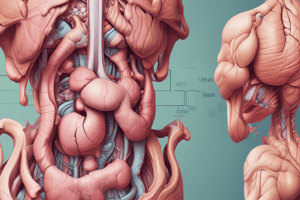Podcast
Questions and Answers
What is a hernia?
What is a hernia?
- A normal part of the muscle or connective tissue
- A tear or rip in the muscle or connective tissue
- A protrusion or bulge that occurs when an organ or tissue pushes through a weakened area in the muscle or connective tissue (correct)
- A protrusion or bulge that occurs when an organ or tissue pushes through a strengthened area in the muscle or connective tissue
What is the most common type of hernia?
What is the most common type of hernia?
- Inguinal hernia (correct)
- Hiatal hernia
- Incisional hernia
- Umbilical hernia
What is a common cause of weakened muscles or connective tissue?
What is a common cause of weakened muscles or connective tissue?
- Exercise
- Sleep
- Diet
- Age (correct)
What is a symptom of a hernia?
What is a symptom of a hernia?
How is a hernia typically diagnosed?
How is a hernia typically diagnosed?
What is a complication of a hernia?
What is a complication of a hernia?
What is a type of hernia repair?
What is a type of hernia repair?
What increases the risk of a hernia?
What increases the risk of a hernia?
Flashcards are hidden until you start studying
Study Notes
Definition and Types
- A hernia is a protrusion or bulge that occurs when an organ or tissue pushes through a weakened area in the muscle or connective tissue that normally holds it in place.
- There are several types of hernias, including:
- Inguinal hernia: occurs in the groin area, most common type
- Umbilical hernia: occurs near the belly button
- Hiatal hernia: occurs in the upper stomach
- Incisional hernia: occurs through a previous surgical incision
- Ventral hernia: occurs in the abdominal wall
Causes and Risk Factors
- Weakened muscles or connective tissue due to:
- Age
- Injury
- Surgery
- Obesity
- Coughing or straining
- Family history
- Increased pressure within the abdominal cavity due to:
- Lifting heavy objects
- Coughing or sneezing
- Straining during bowel movements or urination
Symptoms
- A visible bulge or lump in the affected area
- Discomfort or pain in the affected area, especially with coughing, straining, or lifting
- Feeling of heaviness or pressure in the abdomen
- Discomfort or pain in the testicles (in the case of inguinal hernia)
Diagnosis and Treatment
- Diagnosis is typically made through a physical examination and medical history
- Imaging tests such as CT or MRI scans may be used to confirm the diagnosis
- Treatment usually involves surgery to repair the hernia, either:
- Open hernia repair: a single incision is made to repair the hernia
- Laparoscopic hernia repair: several small incisions are made and a laparoscope is used to guide the repair
- Robotic hernia repair: a robotic system is used to assist with the repair
Complications
- Strangulation: the hernia becomes trapped and its blood supply is cut off, leading to tissue death
- Obstruction: the hernia blocks the intestine, leading to bowel obstruction
- Recurrence: the hernia returns after treatment, often due to inadequate repair or underlying risk factors
Hernia Definition and Types
- A hernia is a protrusion or bulge that occurs when an organ or tissue pushes through a weakened area in the muscle or connective tissue.
- Types of hernias include:
- Inguinal hernia: occurs in the groin area, most common type
- Umbilical hernia: occurs near the belly button
- Hiatal hernia: occurs in the upper stomach
- Incisional hernia: occurs through a previous surgical incision
- Ventral hernia: occurs in the abdominal wall
Causes and Risk Factors
- Weakened muscles or connective tissue can be caused by:
- Age
- Injury
- Surgery
- Obesity
- Coughing or straining
- Family history
- Increased pressure within the abdominal cavity can be caused by:
- Lifting heavy objects
- Coughing or sneezing
- Straining during bowel movements or urination
Symptoms
- A visible bulge or lump in the affected area
- Discomfort or pain in the affected area, especially with coughing, straining, or lifting
- Feeling of heaviness or pressure in the abdomen
- Discomfort or pain in the testicles (in the case of inguinal hernia)
Diagnosis and Treatment
- Diagnosis is typically made through a physical examination and medical history
- Imaging tests such as CT or MRI scans may be used to confirm the diagnosis
- Treatment options include:
- Open hernia repair: a single incision is made to repair the hernia
- Laparoscopic hernia repair: several small incisions are made and a laparoscope is used to guide the repair
- Robotic hernia repair: a robotic system is used to assist with the repair
Complications
- Strangulation: the hernia becomes trapped and its blood supply is cut off, leading to tissue death
- Obstruction: the hernia blocks the intestine, leading to bowel obstruction
- Recurrence: the hernia returns after treatment, often due to inadequate repair or underlying risk factors
Studying That Suits You
Use AI to generate personalized quizzes and flashcards to suit your learning preferences.




